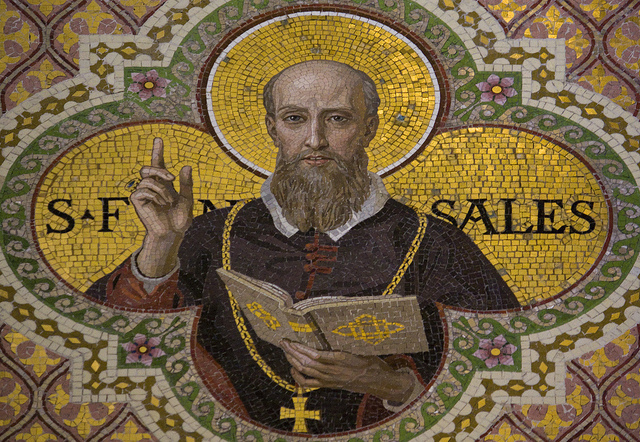
Today we continue our regular series called “Learning from the Saints.” Our guide is expert Bert Ghezzi, a dear friend of mine and the author of numerous books including Voices of the Saints, Saints at Heart, and Discover Christ: Developing a Personal Relationship with Jesus.
His more recent books are The Power of Daily Mass and The Heart of Catholicism. You can learn more about Bert and his work at BertGhezzi.com.
Today, Bert profiles St. Francis de Sales, who is the patron of writers, journalists, the Catholic press, confessors, deaf people, and educators.

“Frequently, on the pretext of some supposed impossibility, people who are obliged to live an ordinary life will not even think of undertaking a devout life. It is their opinion that just as no animal dares to taste the seed of the herb called palma Christi (castor oil plant) so no one should aspire to the palm of Christian piety so long as he is under the pressure of worldly affairs. I shall show to such men that just as the mother-of-pearl fish lives in the sea without taking in a single drop of salt water,…so also a strong resolute soul can live in the world without being infected by any of its moods.” — St. Francis de Sales
In The Introduction to the Devout Life, St. Francis de Sales showed how ordinary people, who are locked daily into worldly routines, could live saintly lives. He argued that not only was holiness possible for people in all walks of life, but that living for God made every calling better. He addresses his reader as Philothea, a soul who loves God:
“No, Philothea, true devotion does us no harm whatsoever, but instead perfects all things. When it goes contrary to a man’s lawful vocation, it is undoubtedly false. ‘The bee,’ Aristotle says, ‘extracts honey out of flowers without hurting them’ and leaves them as whole and fresh as it finds them. True devotion does better still. It not only does no injury to one’s vocation, but on the contrary adorns and beautifies it. All kinds of precious stones take on greater luster when dipped into honey, each according to its color. So also every vocation becomes more agreeable when united with devotion. Care of one’s family is rendered more peaceable, love of husband and wife more sincere, service of one’s prince more faithful, and every type of employment more pleasant and agreeable.”
Readers will not find any new secrets in Francis’ book. What makes it exceptional is his showing how repentance, prayer, the spiritual disciplines and virtues fit in the lives of lay people.
St. Francis’ father had educated him for a brilliant secular career. Instead, however, he became a priest, missionary and bishop. Francis de Sales was an outstanding leader of the Catholic Reformation, a European renewal movement that both preceded and responded to the Protestant Reformation. After his ordination in 1593, he evangelized the people of the province of Chablais, winning many back to the Catholic Church and making many converts.
In 1602, Francis was appointed bishop of Geneva. In that office he proved himself to be an able pastor, administrator and educator. He was also the spiritual director for other saints, including St. Jane de Chantal, who became his close friend in 1604. With her he founded the Order of the Visitation in 1610. He died on December 28, 1622. St. Francis de Sales is a doctor of the Church and the patron saint of writers.
“Ostriches never fly. Hens fly in a clumsy fashion, near the ground, and only once in a while. But eagles, doves and swallows fly aloft, swiftly and frequently. Similarly, sinners never fly up towards God, but hover close to the earth. Good people who are not yet devout, fly toward God by their good works but do so infrequently, slowly and awkwardly. Devout souls ascend to him more frequently, promptly and with lofty flights. In short, devotion is simply that spiritual agility and vivacity by which charity works in us or by aid of which we do good works quickly and lovingly.” — St. Francis de Sales
Read more from Bert at his website www.BertGhezzi.com, or check out his many books on Amazon.
